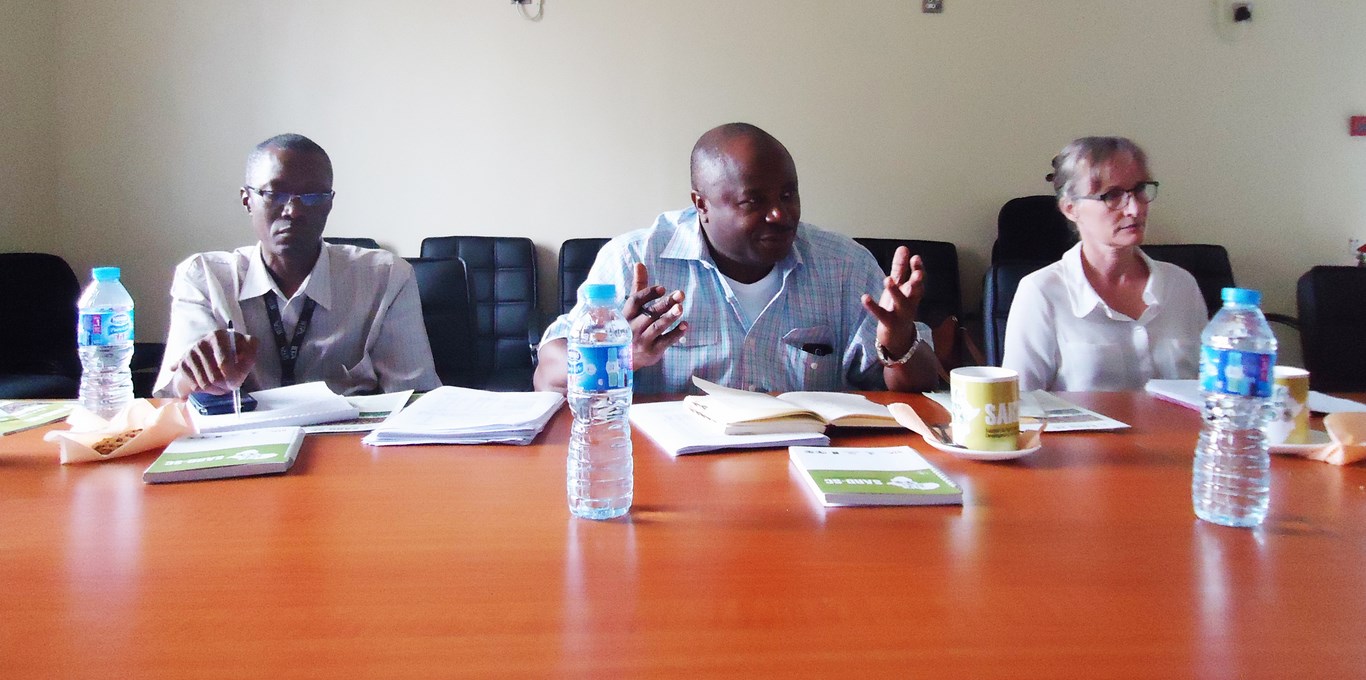The IITA Management has commended the SARD-SC project, funded by the African Development Bank (AfDB), for its highly satisfactory implementation and the meaningful impact the commodity value chains are making in the lives of the beneficiaries. Director General Nteranya Sanginga led the team comprising Mr Kwame Kwame Akuffo-Akoto, Deputy Director General, Corporate Services; Dr Ylva Hillbur, DDG, Research for Development, and Mr Omoshalewa Sholola, Director of Finance, during the recent internal evaluation conducted 21 April.

DG Nteranya Sanginga (middle) driving home a point during the internal project evaluation. Others in photo are (from left) Omoshalewa Sholola, Finance Director, and Ylva Hillbur, DDG, Research for Development.
Dr Sanginga said he was delighted that the project was on track, and praised the achievements recorded so far since its inception in 2012. “I am quite impressed by what you have achieved so far in terms of new varieties, technology dissemination, and value addition to commodities and how they are changing lives, generating income and employment for the people.”
The DG said the evaluation was conducted to give an update of the project’s progress in the areas of technology dissemination in preparation for the Mid-Term Review (MTR), and its financial standing, and also to discuss possible solutions to any implementation challenges.“The SARD-SC project is very important, not because it has a huge budget but in terms of the impact it is designed to have on the productivity of and income from the value chains of the commodities you work with and the lives of the people. This is a project which allows us to assess the impact of some of our mandate crops – cassava, rice, maize, and wheat. It is one project that helps to maintain strong IITA relationships with the AfDB.”
The evaluation started with Dr Chrys Akem, Project Coordinator, presenting an overview of the activities and achievements of the project on the value chains for the four mandate crops. He went on to highlight their impact on the livelihoods of many in the project target countries. His presentation also highlighted new varietal development of the target commodities and their dissemination to farmers and farmers’ groups. He also spoke of the project’s distribution of better quality cassava stems to farmers, improvements in the mechanization of production systems for all the commodities, and infrastructural development with the building of cassava processing centers in DR Congo, Tanzania, Zambia, and Sierra Leone. The establishment of these processing centers had led to new product development (confectionery with cassava flour) hitherto unknown in some of these countries. Consequently, it had fostered a strong sense of community engagement, especially the women. Included in his presentation was an update on the procurement and financial status of the project.
Dr Akem explained that the project activities had been aligned with IITA’s refreshed strategy in the areas of increased food security and availability, increased profitability of food products, and sustainability of natural resource management.
It was not all rosy for the project, as he revealed some of the challenges in the areas of procurement and financial disbursement. He also pointed out some of the opportunities going forward as the project takes on the mid-term review.
The DG urged the project team to ensure that they used the forthcoming MTR as an opportunity to record their recommendations in the Bank’s final documents. Other members of the Management team also provided comments and asked for clarification from the Project Coordinator. Mr Sholola commended the team for effective financial management and control. Mr Akuffo-Akoto advised the team to ensure the sustainability of the structures built in the project areas, whereas Dr Hillbur encouraged them to continue to have strong linkages with other institutional projects.


No Comments